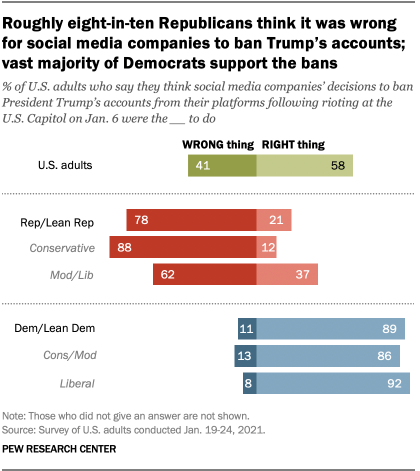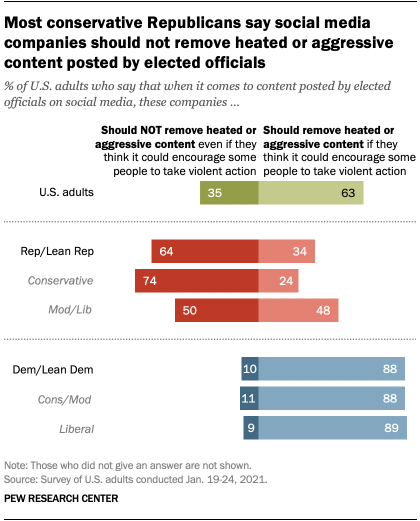Several social media companies banned President Donald Trump from their platforms while he was still in office following rioting at the U.S. Capitol, citing their belief that his posts violated their terms of use and that his rhetoric could result in more violence. Americans are more likely to support rather than oppose this ouster, but views of the bans – and whether these platforms should remove aggressive content more generally – are sharply divided along political lines, according to a new Pew Research Center survey conducted Jan. 19-24, 2021.
Overall, 58% of U.S. adults say they think social media companies’ decisions to ban Donald Trump’s accounts from their platforms following rioting at the U.S. Capitol on Jan. 6 were the right thing to do, while a smaller share – 41% – say these were the wrong thing to do.
Pew Research Center has recently studied Americans’ views on the influence social media companies have on political discourse. Following the riots at the U.S. Capitol on Jan. 6, we fielded a set of questions asking Americans about their views on banning former President Donald Trump’s social media accounts and removing content that could encourage violence.
For this analysis, we surveyed 10,334 U.S. adults from Jan. 19 to 24, 2021. Everyone who took part is a member of the Center’s American Trends Panel (ATP), an online survey panel that is recruited through national, random sampling of residential addresses. This way nearly all U.S. adults have a chance of selection. The survey is weighted to be representative of the U.S. adult population by gender, race, ethnicity, partisan affiliation, education and other categories. Read more about the ATP’s methodology.
Here are the questions, responses and methodology used for this report.
In a period when partisanship has been linked to views about social media bias and censorship, Republicans and Democrats hold sharply contrasting views of these bans. Just 21% of Republicans and Republican-leaning independents say social media companies’ decisions to ban Trump’s accounts were the right thing to do, while 78% say they were wrong. By contrast, the vast majority of Democrats and Democratic leaners (89%) say these bans were the right thing to do. Only 11% of Democrats think it was the wrong decision for social media companies to ban Trump’s accounts.
Opinions on this issue also vary within parties by ideology, but these differences are more pronounced among Republicans than Democrats. While 88% of conservative Republicans believe social media companies’ decisions to ban Trump were the wrong thing to do, that share – though still a majority – drops to 62% among moderate and liberal Republicans. And while only small shares of Democrats across the ideological spectrum say that it was the wrong decision to ban Trump, conservative and moderate Democrats are somewhat more likely than liberal Democrats to think the ban was wrong.
These partisan differences are in line with previous Center surveys that show Republicans are especially likely to disapprove of social media companies labeling posts as misleading or inaccurate, think these platforms have too much political power and influence or believe it’s likely that these sites censor political viewpoints they find objectionable.
Trump’s social media ban is especially striking given how important these platforms – particularly Twitter – have been as a way for him to address his supporters and foes alike. Companies themselves are grappling with the next steps as Facebook and others decide when – and if – Trump should be allowed back on their platforms. Whatever the long-term decisions may be, restrictions on Trump have renewed debates about how much control and responsibility social media companies should have over content that may be deemed to encourage violence.
When asked about this issue more broadly, a majority of Americans are in favor of social media companies taking steps to remove inflammatory content that these firms think could incite violence, the new survey finds. Some 63% of Americans say that social media companies should remove heated or aggressive content posted by elected officials on their platforms if the companies think this content could encourage some people to take violent action. In contrast, 35% say these firms should not remove such content, even if companies think it could encourage violence.
Partisans again express dramatically different views on content removal. Roughly two-thirds of Republicans (64%) say social media companies should not remove heated or aggressive content posted by elected officials, compared with one-in-ten Democrats who say the same. By contrast, Democrats overwhelmingly favor this type of intervention – about nine-in-ten (88%) say the content should be removed.
Conservative Republicans are particularly likely to oppose removal, with 74% saying social media companies should not take this action for content posted by elected officials. The views of moderate or liberal Republicans are more evenly split, with 50% saying such content should not be removed. There are no differences by ideology among Democrats.
Americans hold similar views if asked what these companies should do about heated or aggressive content posted by ordinary users. Some 63% say that social media companies should remove content of this nature posted by ordinary users if they think it could encourage violence, while 35% think these companies should not do so in this context – the same pattern present for content posted by elected officials. (Respondents were randomly assigned questions about whether social media companies should remove content posted by elected officials or ordinary users.)
These findings relate to a previous Center survey exploring the impact of heated or aggressive speech by elected officials in general – not just on social media. In a 2019 survey, about eight-in-ten Americans (78%) said that elected officials using heated or aggressive language to talk about certain people or groups makes violence against those people or groups more likely. Far fewer (21%) said this type of language does not make violence more likely.
Majorities in both parties said they think there is a connection between the language officials use to talk about certain people or groups and the possibility of violence, but this view was more widely held among Democrats (91%) than among Republicans (61%).
Note: Here are the questions, responses and methodology used for this report.



